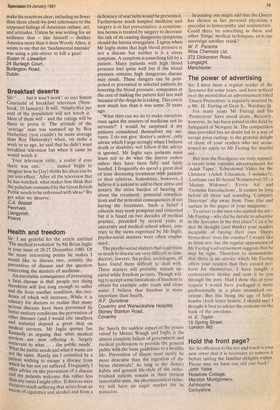Health and freedom
Sir: I am grateful for the article entitled The medical revolution' by Mr Brian Inglis in your issue of 20-27 December 1980. Of the many interesting points he makes I. would like to discuss two, notably the Prevention of disease and the question concerning the masters of medicine. An inevitable consequence of preventing a fatal disease is that people not dying therefrom will live long enough to suffer and die from another condition, the incidence of which will increase. While it is salutary for doctors to realise that many serious diseases have been prevented by better sanitary conditions the prevention of Other diseases (and I \ would cite smallpox and malaria) depend a great deal on medical services. Mr Inglis quotes Ian Kennedy as arguing that what medical services are now offering is `largely irrelevant to what . . . the public needs'. What the public needs and what it wants are not the same. Rarely am I consulted by a patient wishing to escape a disease from which he has not yet suffered. Frequently I °ffer advice on the prevention of a disease ,11(1 my patients welcome this rather less wan any Cures! might offer. If doctors were dictators much suffering that arises from an excess of cigarettes and alcohol and from a deficiency of seat belts would be prevented. Furthermore much hospital medicine and surgery is in fact preventative: a symptomless hernia is treated by surgery to decrease the risk of its causing dangerous symptoms should the hernia strangulate. I agree when Mr Inglis states that high blood pressure is not a disease but neither is it a stress symptom. A symptom is something felt by a patient. Many patients with high blood pressure feel quite well but if the blood pressure remains high dangerous disease may result. These dangers can be postponed or prevented in selected patients by lowering the blood pressure, sometimes at the cost of making the patient feel less well because of the drugs he is taking. This cost is now much less than it was some 20 years ago.
'What then can we do to make ourselves once again the masters of medicine not its servants?' I would be surprised if my patients considered themselves my servants. I do not give `doctor's orders', only advice which I urge strongly when I believe death or disability will follow if the advice is ignored. Mr Inglis says patients must learn not to do what the doctor orders unless they have been fully and fairly briefed. I frequently do spend a great deal of time discussing treatment with patients or their relatives. Sometimes, however, I believe it is unkind to add to their stress and anxiety the extra burden of hearing all about the treatment, potential complications and the potential consequences of not having the treatment. Such a belief I ccincede may seem pompous and conceited but it is based on two decades of medical practice, preceded by several years at university and medical school where, contrary to the views expressed by Mr Inglis, psycho-social matters were often emphasised.
The psycho-social matters that contribute so much to disease are very difficult to cure: doctors, lawyers, the police, sociologists, all have found them difficult to deal with. These matters will probably remain uncured while freedom persists. Though willing to accept some limitations of freedom to obtain for example safer roads and clean water, I believe that freedom is more important than health.
R. F. Gunstone Coventry and Warwickshire Hospital, Stoney Stanton Road, Coventry Sir: Surely the saddest aspect of the points raised by Messrs Waugh and Inglis is the almost complete failure of government and medical professions to provide the general public with the basic guidelines to a healthy life. Prevention of illness must surely be more desirable than the ingestion of dubious chemicals? As long as the dietary habits and general life-style of the industrialised nations remain in their present lamentable state, the pharmaceutical industry will have an eager market for its panaceas. In passing one might add that the Queen has chosen as her personal physician a specialist in homeopathy and acupuncture. Could there be something in these and other 'fringe' medical techniques, or is our sovereign another crank?
W. F. Parsons Wise Chemists Ltd, 372 Dickenson Road, Longsight, Manchester






































 Previous page
Previous page